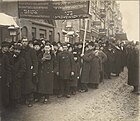| Part of a series on |
| Bundism |
|---|
 |
| 1890s to World War I |
|
| Interwar years and World War II |
| After 1945 |
|
| People |
| Press |
| Songs |
| Associated organisations |
| Splinter groups |
|
| Categories |
| Part of a series on |
| Jews and Judaism |
|---|
Bundism was a secular Jewish socialist movement whose first organizational manifestation was the General Jewish Labour Bund in Lithuania, Belarus, Poland, and Russia (Yiddish: אַלגעמײנער ייִדישער אַרבעטער־בונד אין ליטע, פוילין און רוסלאַנד, romanized: Algemeyner yidisher arbeter-bund in Lite, Poyln un Rusland), founded in the Russian Empire in 1897.
The Jewish Labour Bund was an important component of the social democratic movement in the Russian empire until the 1917 Russian Revolution; the Bundists initially opposed the October Revolution, but ended up supporting it due to pogroms committed by the Volunteer Army of the anti-communist White movement during the Russian Civil War. Split along communist and social democratic lines throughout the Civil War, a faction supported the Soviet government and eventually was absorbed by the Communist Party.
Bundist movement continued to exist as a political party in independent Poland in the interwar period as the General Jewish Labour Bund in Poland, becoming a major political force within Polish-Jewish communities. Bundists were active in the anti-Nazi struggle, and many of its members were murdered during the Holocaust.
After the war, the International Jewish Labor Bund, more properly the "World Coordinating Council of the Jewish Labor Bund", was founded in New York, with affiliated groups in Argentina, Australia, Canada, France, Israel, Mexico, the United Kingdom, the United States, and other countries.
Though extant after the war and undergoing a revival in the 21st century,[1] according to David Kranzler, the movement and its relatives (e.g. the Gordonia youth movement) were relatively unsuccessful in accomplishing their goals in Europe,[2] though they were popular.
- ^ Silverstein, Andrew (2024-02-21). "In the story of two Jewish Bunds, a stark generational divide over Israel". The Forward. Retrieved 2024-02-25.
- ^ Kranzler, David. Secular Jewish Ideologies. Feldheim Publishers. ISBN 978-1-59826-962-8.
{{cite book}}:|work=ignored (help)
